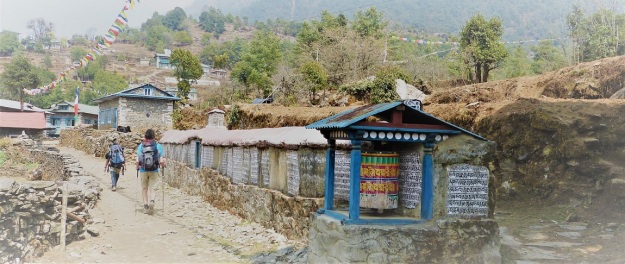
Route = Paiya (2770m) – Surke (2290m) – Phakding (2610m) – Namche Bazaar (3440m)
Date = 14-15 March
For a third day in a row Angtu has L&D up and walking by 7.30am. Today they need to reach their long awaited beacon of luxury, however long it takes. At last the snow covered peaks are getting closer as the trail turns north towards the high Himalayas. The landscape is stretching and distorting, becoming taller and deeper and steeper. Below the path, the slope tumbles 1,000 metres to the cold blue thread of the Dudh Kosi river. Overhead buzz 18-seater Twin Otter planes landing and taking off at Lukla – so dwarfed by their surroundings that they resemble tiny white insects, impossibly vulnerable. D&L watch as the insects touch down with absolute precision on the 30 metre wide strip of runway on the edge of a cliff, braking hard as they disappear from view, roaring up the 12% gradient to stop, they hope, in less than 527 metres, at which point the tarmac ends and the mountain begins.
In the village of Surkey, they round a corner to find 30 people blocking their path.
L: Whatever’s going on? Is it a wedding? A funeral? A protest march?
D: It’s a trekking group.
L: Oh. What on earth are they doing here?
D: Umm…trekking.
L: But these are our mountains. Make them go away.
D: You’d better get used to it. We’re about to join the main route to Everest Base Camp. You’re going to be sharing your mountains with a lot of other people.
Angtu: In the busy season, if the weather’s good, maybe 30 flights land at Lukla every day. That’s nearly 600 people coming in. And 600 people leaving. A lot of people.
L: A LOT of people!
Angtu chats to the group’s guides, shaking hands with them and laughing. He returns.
Angtu: Don’t worry. They’re going the other way.
After a brief stretch of supremely flat engineered trail, they pass a junction, lose the trekkers, and the surface beneath their feet crumbles once more. From here, for a few hours, there is nothing and no-one, no people or donkeys or lodges, just pine trees and views and the roar of the Dudh Kosi tumbling over boulders far below. The trail clings to the side of the mountain, and the drops are dizzying. It’s beautiful.
 They come to Moshe, a medieval-looking collection of tiny stone cottages and doorways in rock-faces. The land is worked – divided into little stone-walled fields and compounds. There are no shops or lodges or tea-houses. More than anywhere they’ve walked through so far, this place seems utterly untouched by tourism and modernity, separate, forgotten. Lukla’s town and airport are invisible and yet just a few hundred vertical metres above them. They are right in the flight path. Some days 1000 people pass over their heads, but each is oblivious to the other. They are worlds apart.
They come to Moshe, a medieval-looking collection of tiny stone cottages and doorways in rock-faces. The land is worked – divided into little stone-walled fields and compounds. There are no shops or lodges or tea-houses. More than anywhere they’ve walked through so far, this place seems utterly untouched by tourism and modernity, separate, forgotten. Lukla’s town and airport are invisible and yet just a few hundred vertical metres above them. They are right in the flight path. Some days 1000 people pass over their heads, but each is oblivious to the other. They are worlds apart.
The village goes on and on. And on. Moshe morphs into Chaurikharka, with its neat, good sized houses newly painted. There is an almost continuous display of long mani walls, prayer wheels and prayer flags along the main street. Everything is tidy and well maintained. There are no people, no donkeys and still no shops or lodges or tea-houses or bustle of everyday living.
L: Where is everyone? It’s bordering on spooky.
D: You’re probably just hungry.
L: I am quite hungry.
On and on they walk, through the village, looking for anywhere that might provide lunch. But no-one is opening their kitchens to feed hungry porters and trekkers, and there are no porters or trekkers to feed. This is a community not on a trading route. All the foot traffic heading to Lukla will bypass this valley. However unlike Moshe, it seems there’s money trickling in from somewhere – Lukla’s tourist dollars reaching them by osmosis – to fund the maintenance of houses, walls and lanes.
L: D’you think a community is better or worse off if they can benefit from tourism without the tourists?
D: Better off, surely, without hundreds of the likes of us marching through.
L: But there’s no life here. Without the passers-by, there’s no commerce.
D: Or worse off. I don’t know. You’re confusing me. I need my lunch.
On and on they go. The few buildings that might be lodges are closed.
Angtu: Hungry? We’ll find somewhere soon. At least it’s flat.
L: It’s definitely uphill.
Angtu grins, dismissing the insignificant gradient.
Angtu: Nepali flat.
At the very top of the village is a huge empty lodge. It is open.
After lunch they emerge onto the main route opposite what looks like a smart English country pub. The engineered paving is back, flat and smooth and wide enough to drive along, lined at intervals with lodges and restaurants and tea-houses, and busy with trekkers and porters.
There is a clear division between trekking porters and commercial porters. The former work with tourists, and are usually young, well equipped with footwear and appropriate clothing, and their tumplines suspend waterproof kit-bags supposedly limited to 30kg. They trot along the trails, skipping up and down the steep slopes at twice the speed of the trekkers. They cover a relatively short distance per day, as they are limited to going only as far as the trekkers can manage, and earn about $15-20/day.
Commercial porters supply stores and lodges with food, consumables and building materials. They tend to be older and dressed more simply, shod in trainers or crocs or even sandals. Their tumplines support a doko basket, loaded with as much weight as they can manage – there are no limits. Often they are carrying as much as or more than their own body weight. They move slower, rest more frequently, and carry a short T-handled walking stick called a tokma, on which they can balance their load to rest while standing. They cover more ground and earn less than trekking porters, being paid by the kilo.
 There is also a hybrid third group – the expedition porters. These guys tend to look and dress like trekking porters – young, fit and reasonably well equipped. However, it seems that they too are paid by the kilo as they carry ludicrous loads, the furthest distance, to base camps at the foot of the world’s highest mountains, covering many miles a day. They are doubled over under towers of chairs, rolls of carpet, steel folding tables, mattresses, drums of climbing gear, cooking gas cylinders, pots and pans. It’s seasonal and punishing work, but lucrative if they can get it.
There is also a hybrid third group – the expedition porters. These guys tend to look and dress like trekking porters – young, fit and reasonably well equipped. However, it seems that they too are paid by the kilo as they carry ludicrous loads, the furthest distance, to base camps at the foot of the world’s highest mountains, covering many miles a day. They are doubled over under towers of chairs, rolls of carpet, steel folding tables, mattresses, drums of climbing gear, cooking gas cylinders, pots and pans. It’s seasonal and punishing work, but lucrative if they can get it.
As has become a pattern, the day has by now clouded over. In the village of Ghat, they spot a small tatty-looking sign to their destination, and Angtu seeks directions. They leave the main route and cross a swathe of landslip. A young woman overtakes them, cheerfully swinging a large mouse in a small cage, and talking on her phone.
D: Umm…Angtu? What’s….?
Angtu: It’s a rat trap. The rats eat the food supplies, which is very bad. So she will take it to the far side of the river, to set it free where it can’t come back.
As if the mani walls and prayer wheels and prayer flags and stupas weren’t clues enough, they are reminded yet again that this is Buddhist country.
They cross the Dudh Kosi on a suspension bridge, feeling the chill of the water waft up around them, and climb through pine forest. Though surprised at the approach on what is barely more than an animal track, every minute they expect to arrive, to walk through the doors of welcoming luxury. Forty minutes later they reach a tiny farming village teetering precariously at the top of an enormous landslide. Angtu again asks directions. They follow a high walled lane, climb over a fence and walk through a yak enclosure, to arrive at an unsigned single storey stone building. They have arrived.
The door is opened by a tall slender Nepali woman whose poised stature and fine features are unlike the small, soft, rounded faces that they have become familiar with. The interior is stylish and comfortable – books and cushions and Buddhist artwork.
 Angtu acts as translator and go-between, making sure they have everything they need.
Angtu acts as translator and go-between, making sure they have everything they need.
Angtu: Tea?
L: My usual. Hot lemon please.
Angtu: No hot lemon.
L: Oh. OK. Tea please. Could you ask for the wifi password?
Angtu: No wifi.
L: Oh. Well. Never mind.
Angtu: Are you ready to order dinner?
D: Yes. Can we see the menu?
Angtu: No menu.
D: Right, what is there?
Angtu: Spaghetti or dal bhat.
L: I think I’ll have….
Angtu: And you have to both choose the same.
L: Oh.
D: We’ll have dal bhat.
Angtu: And salad?
L: Green things? For the first time in 10 days? Yes please!
Angtu: OK – we’re going now.
D: Hold on – where are you off to?
Angtu: Down to Phakding.
L: That’s an hour away. Why aren’t you staying here?
Angtu: They don’t have a room.
D: Are they full?
Angtu: No. There are no other guests. But they don’t have a room.
He shrugs and grins and rubs his tummy.
Angtu: We have friends in Phakding. We’ll eat momos.
Their room is cold but beautifully decorated and the duvet is thick. The bed is….
L: Oh.
D: What?
L: Hard. It’s a futon mattress. It’s less comfy than the lodges.
The dal bhat is tasty, but the salad is scrumptious. L abandons her rice and gorges on unidentified greenness: crispy and crunchy and bitter and sweet and lemony and fragrant. There are herbs and little beans or peas or nuts – she can’t tell which. She doesn’t care. She just keeps eating.
D: It’s risky.
L: What is?
D: That salad. It may make you ill.
L: It tastes much too good.
D: You’re living life on the edge.
***
Angtu and Phurba return in the morning.
Angtu: So was it worth it?
L: No. Though the salad was amazing. But I never would have booked if I’d thought they wouldn’t give you both a room.
Angtu: We saw friends. We ate momos. Maybe too many.
He disappears discreetly for about the 5th time that morning. This is most unlike him. Usually he is happy to share his bathroom habits with his trek-mates, having first chosen a nice viewpoint:
Angtu: It’s my time – natural toilet!
They are alone on a hillside of pines, paralleling the river and the main trekking route. Between Phakding and the river are fertile fields and a series of polythene greenhouses. At around 2,600m, this is the region’s kitchen garden, with a 9 month growing season and plenty of moisture, providing greens for the higher, colder settlements further up the trail. Angtu whistles. A tiny figure emerges from a greenhouse half a mile away. They both wave and whistle some more. Angtu smiles.
Angtu: My friend.
They join the main trail, following the Dudh Kosi upstream, past small-holdings, stupas and mantra- painted boulders, shops and tea-houses. They pause to watch a group of laden cattle crossing a suspension bridge.
 D: Are those yaks?
D: Are those yaks?
Angtu: Or naks. Yaks are male. Naks are female. But these aren’t either.
D: So what are they?
Angtu: These ones are dzopkyo – half yak, half cow. You probably won’t see proper yaks till we get higher.
D: OK. Chopki. Got it.
They pass through a checkpoint and Angtu heads off with a fistful of paperwork. A sign says “Welcome to Sagarmatha National Park – World Heritage Natural Site”. They sit on a wall to wait and read about the park.
L: As well as Everest, it’s got 7 other peaks over 7,000 metres.
D: Excellent. We’ll see some of those.
L: And glaciers.
D: Cool – we’ll see some of them.
L: And “the unique culture of the Sherpa people”.
D: We’ll see some of that.
L: And snow leopards and red pandas.
D: I doubt we’ll see those.
L: It gets 30,000 visitors…
D: Yikes, I hope we don’t see all of them.
L: ….a year, which has massively boosted the local economy and made access for local people much easier to things like healthcare and schools.
D: That’s good.
L: And has led to a lot of investment in infrastructure, such as bridges and trails.
D: That’s good too.
L: But it also means the cost and demand for food has gone up a lot too.
D: Not so good if you’re not getting an income from tourism.
L: No. Guess what percentage of the park is forested?
D: Tell me.
 L: 3%. Hardly any. And guess how much is barren land over 5,000 metres?
L: 3%. Hardly any. And guess how much is barren land over 5,000 metres?
D: Umm….
L: Too slow. 69%! Most of it’s over 5,000 metres!
D: What’s the rest?
L: Grazing.
D: I’m worried about the 3%. The trees.
L: You’re not allowed to burn firewood in the park. From live trees. They only burn yak dung. And rubbish. And dead trees, though there really aren’t any. And they’re replanting bits.
D: OK.
Angtu returns.
Angtu: Shall we go? Slowly slowly?
He’s worried about the big climb ahead to Namche Bazaar. The guidebooks describe it as torturous. L is coughing much less now but he’s not sure how she’ll do. He’s still not feeling great himself.
They stop for lunch in a restaurant crammed with several large trekking groups, and sit at the end of a long table feeling overwhelmed by the crowd. Outside it begins to rain.
 It’s still spitting when they make their way alongside the river bed, on a path of worn-smooth river stones. Ahead across the river are two long suspension bridges, one above the other, reaching from one hillside to the next. The lower one is no longer used. The higher one is a very long way up.
It’s still spitting when they make their way alongside the river bed, on a path of worn-smooth river stones. Ahead across the river are two long suspension bridges, one above the other, reaching from one hillside to the next. The lower one is no longer used. The higher one is a very long way up.
They start to climb. People keep getting in the way. To their surprise they overtake one group after another, one person at a time. Most of these trekkers flew straight into Lukla yesterday and so are less fit and less acclimatised. L&D have been walking for 10 days. They bounce across the suspension bridge happily, watching others cling to the swaying sides in terror. It is a very long way down. The drizzle turns to rain and sets in. They put on their waterproofs and set off up the broad, sandy zigzagging path. It is mercilessly steep. They get into a rhythm, overtaking trekker after trekker after trekker – not because they are faster but because they don’t need to stop and rest. Even Angtu can hardly keep up.
Angtu: We are strong!
L: I feel strong. I can breathe! It’s amazing!
Angtu: Stop and rest? Or keep going?
L: Keep going. I’m fine.
D: It’s not a race, you know.
L: Of course it’s a race.
They’re treating themselves again. While they can. The Yeti Mountain Home is right at the top of Namche Bazaar, almost in the cloud. After last night they are braced for more disappointment. At the door, boots are traded for the crocs provided. The sole is flapping off one of L’s crocs so she has to walk with a limp to avoid tripping over it. They are welcomed, given hot towels and a pot of lemon tea. The reception area is bitingly cold, but their bedroom is cosy and comfortable and carpeted. It has panoramic views down over Namche Bazaar. It has a heater! An electric blanket! Great thick duvets and great thick mattresses. An en-suite bathroom! The shower dispenses masses of scalding hot water, solar heated on the roof above. They shower, wash their hair, and get straight into bed. It’s the middle of the afternoon. It is heavenly.
 There’s good news – the hotel is giving Angtu free accommodation and meals.
There’s good news – the hotel is giving Angtu free accommodation and meals.
L: And Phurba?
Angtu: He will stay in town. I’ll find him somewhere. I’ll look after him.
L: Oh. Somewhere nice.
Angtu: This is normal. It’s how things are.
It’s not ideal but they accept it. They’re grateful for Angtu’s free place. He joins them for supper.
D: How’s Phurba?
Angtu: He’s happy. He’s found friends. I had dinner with him. More momos.
Three bowls of soup arrive.
Angtu: Not for me – oh, ok then.
They finish their soup. Vast amounts of Chinese food arrive. The unexpected flavours make a nice change.
Angtu: Not for me – oh, ok then.
There is much more than they can eat. But Angtu is not one to waste an opportunity. He eats until he is about to burst. One of the waitresses is married to his wife’s brother. They leave him there chatting and go back to bed.
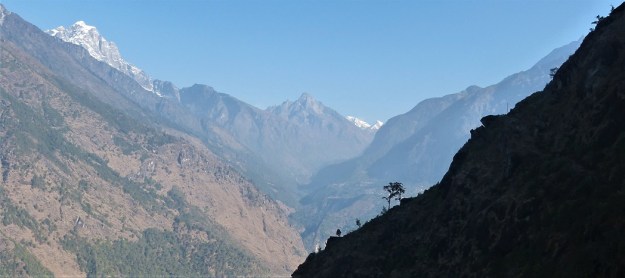

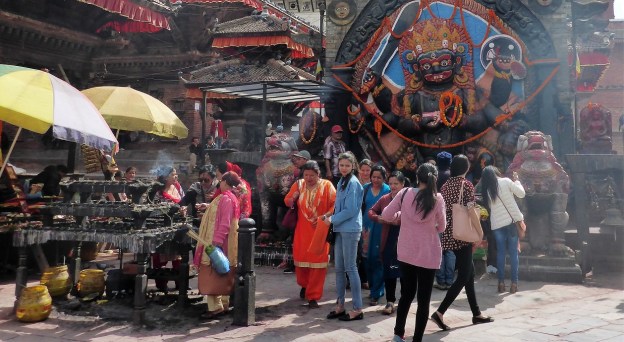


 They wander the maze of narrow mostly-pedestrian lanes of Kathmandu’s Thamel district. Many are unpaved, dusty, with rubble-filled potholes. Crumbling buildings reach 4 stories overhead, festooned with electric cables which meet in clumps of aerial spaghetti at every junction. Dust hangs heavy in the air, mingling with the aroma of spices and incense. They pop into The North Face and inspect a deliciously warm looking down jacket. They peer at the price tag.
They wander the maze of narrow mostly-pedestrian lanes of Kathmandu’s Thamel district. Many are unpaved, dusty, with rubble-filled potholes. Crumbling buildings reach 4 stories overhead, festooned with electric cables which meet in clumps of aerial spaghetti at every junction. Dust hangs heavy in the air, mingling with the aroma of spices and incense. They pop into The North Face and inspect a deliciously warm looking down jacket. They peer at the price tag. Not all are there for the tourists though. Two women squat in the sun washing roof tiles whilst a group of men rest idly by. A monkey ambles past chewing a piece of fruit. A tiny boy dances amidst a rising cloud of pigeons. A youth dozes in a temple doorway and an elderly gentleman pauses to read his newspaper, the roof above his head providing welcome shade and supported by beams carved with graphic sexual contortions. In one peaceful courtyard, the blank windows hide the Royal Kumari – a little girl worshipped by Hindus as the Living Goddess of Nepal. It is believed the goddess within her leaves at puberty, at which time she will be sent home and replaced with another.
Not all are there for the tourists though. Two women squat in the sun washing roof tiles whilst a group of men rest idly by. A monkey ambles past chewing a piece of fruit. A tiny boy dances amidst a rising cloud of pigeons. A youth dozes in a temple doorway and an elderly gentleman pauses to read his newspaper, the roof above his head providing welcome shade and supported by beams carved with graphic sexual contortions. In one peaceful courtyard, the blank windows hide the Royal Kumari – a little girl worshipped by Hindus as the Living Goddess of Nepal. It is believed the goddess within her leaves at puberty, at which time she will be sent home and replaced with another.

 L: The runway is ludicrously short, with a massive cliff to fall off at one end and an enormous mountain to bump into at the other. And no runway lights. And high winds. And thick cloud.
L: The runway is ludicrously short, with a massive cliff to fall off at one end and an enormous mountain to bump into at the other. And no runway lights. And high winds. And thick cloud.
 Their tiny room has plywood walls and ceiling, two narrow single beds – each with a foam mattress, bedcover, duvet and pillow – and a padlock on the door. There is a bare light bulb and curtains on the windows. There is a plug socket in the room, and astonishingly, wifi, though neither of these actually work. This is the template for pretty much all their accommodation throughout the month-long trek.
Their tiny room has plywood walls and ceiling, two narrow single beds – each with a foam mattress, bedcover, duvet and pillow – and a padlock on the door. There is a bare light bulb and curtains on the windows. There is a plug socket in the room, and astonishingly, wifi, though neither of these actually work. This is the template for pretty much all their accommodation throughout the month-long trek.

 Angtu sets a steady, sustainable pace, leading the way, and L is relieved that she can keep up. Phurba walks with them, and the two Nepalis chat and laugh their way up the hill. They cross, and recross, and briefly follow the road. The road is not actually a road, but a road-sized sandy ribbon, winding its way ever deeper into these hills, promising long-awaited access for remote villages to schools and doctors, markets and jobs. For now though, the only people on it are builders and engineers and surveyors. Those on foot keep away – there is too much dust and not enough shade – and no-one has a vehicle anyway.
Angtu sets a steady, sustainable pace, leading the way, and L is relieved that she can keep up. Phurba walks with them, and the two Nepalis chat and laugh their way up the hill. They cross, and recross, and briefly follow the road. The road is not actually a road, but a road-sized sandy ribbon, winding its way ever deeper into these hills, promising long-awaited access for remote villages to schools and doctors, markets and jobs. For now though, the only people on it are builders and engineers and surveyors. Those on foot keep away – there is too much dust and not enough shade – and no-one has a vehicle anyway.

 L&D have filled their pack with coloured pencils and crayons to give to village schools. They walk across the dusty yard, where a number of tiny children in lilac shirts and dark trousers are emerging from the building. They have crocs on their feet and a few are wearing ties. L&D greet the three female teachers. They rummage in their pack and hand out pencils and crayons as the kids crowd around them. The teachers explain that the school has 25 pupils aged between 6 and 15, though today there are only 20. They seem younger, none of them much older than 9.
L&D have filled their pack with coloured pencils and crayons to give to village schools. They walk across the dusty yard, where a number of tiny children in lilac shirts and dark trousers are emerging from the building. They have crocs on their feet and a few are wearing ties. L&D greet the three female teachers. They rummage in their pack and hand out pencils and crayons as the kids crowd around them. The teachers explain that the school has 25 pupils aged between 6 and 15, though today there are only 20. They seem younger, none of them much older than 9. Bhandar is idyllic – a widely spaced scattering of attractive stone buildings on a gentle slope of green meadow. It was badly damaged in the earthquake of 2015 and lots of rebuilding is going on. The lodges around the central square are full of road-building engineers, so they continue to the very bottom of the village. At their whitewashed, blue balconied lodge, sunshine streams through the windows. The mattresses are very thin. Downstairs there is one indoor squat loo, but no water has been provided.
Bhandar is idyllic – a widely spaced scattering of attractive stone buildings on a gentle slope of green meadow. It was badly damaged in the earthquake of 2015 and lots of rebuilding is going on. The lodges around the central square are full of road-building engineers, so they continue to the very bottom of the village. At their whitewashed, blue balconied lodge, sunshine streams through the windows. The mattresses are very thin. Downstairs there is one indoor squat loo, but no water has been provided. They drop towards the river, peeling off layers of clothing as they go. The day is warming up under a strong sun. A track winds around the hillside, where deep red rhododendrons and pink-blossomed fruit trees are in flower. They descend through wet, irrigated gullies of cardamom plants. As they dash to dodge the sprinklers Angtu explains.
They drop towards the river, peeling off layers of clothing as they go. The day is warming up under a strong sun. A track winds around the hillside, where deep red rhododendrons and pink-blossomed fruit trees are in flower. They descend through wet, irrigated gullies of cardamom plants. As they dash to dodge the sprinklers Angtu explains. Kinja sits where a confluence of rivers force a widening of the valley floor. There are enormous boulders strewn about, possibly ancient remnants of glacial moraine, as they do not appear to have tumbled from the mountainsides above. The village was badly shaken by the earthquake and there is plenty of construction taking place. A couple of boys clatter past, to and fro along the neatly paved alleys, with wheelbarrows full of building stone. The end wall has fallen off a house nearby, and another is crumbling and abandoned, used only to tether a goat from a doorpost. Laundry is spread out on a woodpile to dry, and a solar kettle reflects the sunlight from its enormous mirrored dish to a blackened pot suspended at its centre. Flowering nasturtiums crawl over a low wall and a cactus tree provides an incongruous foreground for the distant snows beyond.
Kinja sits where a confluence of rivers force a widening of the valley floor. There are enormous boulders strewn about, possibly ancient remnants of glacial moraine, as they do not appear to have tumbled from the mountainsides above. The village was badly shaken by the earthquake and there is plenty of construction taking place. A couple of boys clatter past, to and fro along the neatly paved alleys, with wheelbarrows full of building stone. The end wall has fallen off a house nearby, and another is crumbling and abandoned, used only to tether a goat from a doorpost. Laundry is spread out on a woodpile to dry, and a solar kettle reflects the sunlight from its enormous mirrored dish to a blackened pot suspended at its centre. Flowering nasturtiums crawl over a low wall and a cactus tree provides an incongruous foreground for the distant snows beyond.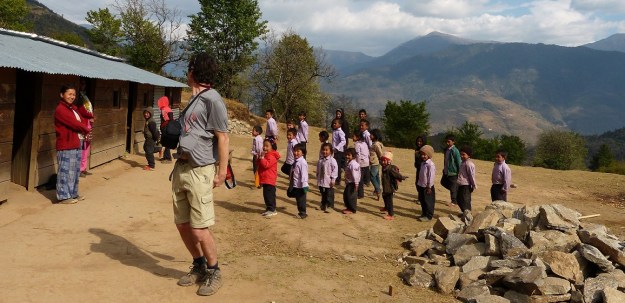
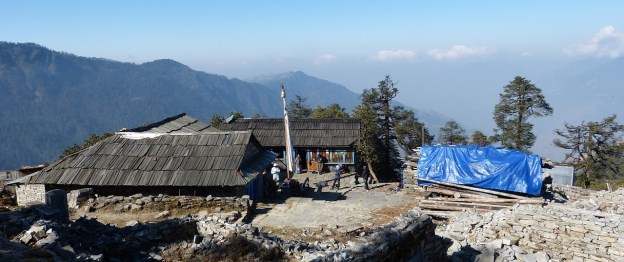
 D&L wait patiently outside the guesthouse for Angtu, Phurba and the hostesses to finish flirting and taking selfies with each other. The sky is cloudless but a little hazy. They climb steeply passing isolated dwellings in impossibly inaccessible places, frilled all around by the narrowest of terraces – some barely a metre wide. Under one spreading tree – a cloud of white blossom – a man slowly drives a pair of cattle and a wooden plough through the dusty earth.
D&L wait patiently outside the guesthouse for Angtu, Phurba and the hostesses to finish flirting and taking selfies with each other. The sky is cloudless but a little hazy. They climb steeply passing isolated dwellings in impossibly inaccessible places, frilled all around by the narrowest of terraces – some barely a metre wide. Under one spreading tree – a cloud of white blossom – a man slowly drives a pair of cattle and a wooden plough through the dusty earth.

 Unlike yesterday’s balmier climes, it is 4°C in their bedroom this morning. They poke their noses out of the nest of bedclothes.
Unlike yesterday’s balmier climes, it is 4°C in their bedroom this morning. They poke their noses out of the nest of bedclothes. Eventually the terrain flattens and opens into wide alpine meadows with cattle enclosures. At the edge of Taktor they pause at a tea-house. On a wall is a large basket – a doko – full of rhododendron leaves collected from the forest for cattle fodder. Indoors a cat sits on top of the hearth, next to a cauldron of hot water. Their hostess prepares noodle soup – feeding the fire carefully with wood, and removing it again once it has served its purpose – preserving it as a scarce resource.
Eventually the terrain flattens and opens into wide alpine meadows with cattle enclosures. At the edge of Taktor they pause at a tea-house. On a wall is a large basket – a doko – full of rhododendron leaves collected from the forest for cattle fodder. Indoors a cat sits on top of the hearth, next to a cauldron of hot water. Their hostess prepares noodle soup – feeding the fire carefully with wood, and removing it again once it has served its purpose – preserving it as a scarce resource.

 High above Jumbesi, below the monastery, towers an immaculate white and gold stupa. Four layers of niches wrap around the circumference, and in each little midnight-blue alcove sits a tiny golden Buddha. Prayer flags stream from the pinnacle in all directions. Mani stones, mantra-covered boulders, and prayer wheels mark the onward route.
High above Jumbesi, below the monastery, towers an immaculate white and gold stupa. Four layers of niches wrap around the circumference, and in each little midnight-blue alcove sits a tiny golden Buddha. Prayer flags stream from the pinnacle in all directions. Mani stones, mantra-covered boulders, and prayer wheels mark the onward route.
 In one courtyard nuns have spread maize kernels on large tarpaulin sheets. One is kneeling, crushing the kernels under a rock, whist a shaggy white pony stands at her shoulder hoping for a meal of husks. At a waist-high wooden pestle and mortar, the maize is further ground by two more nuns, heavy wooden clubs raised and lowered, pummelling rhythmically, wood on wood.
In one courtyard nuns have spread maize kernels on large tarpaulin sheets. One is kneeling, crushing the kernels under a rock, whist a shaggy white pony stands at her shoulder hoping for a meal of husks. At a waist-high wooden pestle and mortar, the maize is further ground by two more nuns, heavy wooden clubs raised and lowered, pummelling rhythmically, wood on wood. D: A black dog!
D: A black dog! The following morning they try again.
The following morning they try again. The day is overcast but dry. The landscape is beautiful – a gentle path undulating around meadowy hillsides, through clumps of fir trees, past grazing cattle and (clockwise) around stupas and prayer flag poles. They cross a river on a swaying steel suspension bridge above a group of mani boulders painted in multi-coloured mantras. Despite the mild gradient and the fact that they are still at well under 3000m, L walks slowly, panting like crazy, as though her lungs are battling the thin air of high altitude. She is coughing so much that her chest hurts and her stomach muscles are sore. The three hour walk to Ringmo takes five and the final 200 metre climb finishes her off. She staggers into the first guest house they come across.
The day is overcast but dry. The landscape is beautiful – a gentle path undulating around meadowy hillsides, through clumps of fir trees, past grazing cattle and (clockwise) around stupas and prayer flag poles. They cross a river on a swaying steel suspension bridge above a group of mani boulders painted in multi-coloured mantras. Despite the mild gradient and the fact that they are still at well under 3000m, L walks slowly, panting like crazy, as though her lungs are battling the thin air of high altitude. She is coughing so much that her chest hurts and her stomach muscles are sore. The three hour walk to Ringmo takes five and the final 200 metre climb finishes her off. She staggers into the first guest house they come across.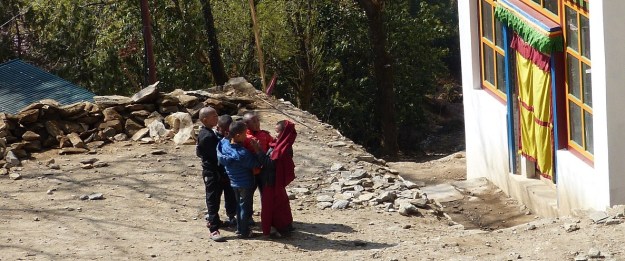
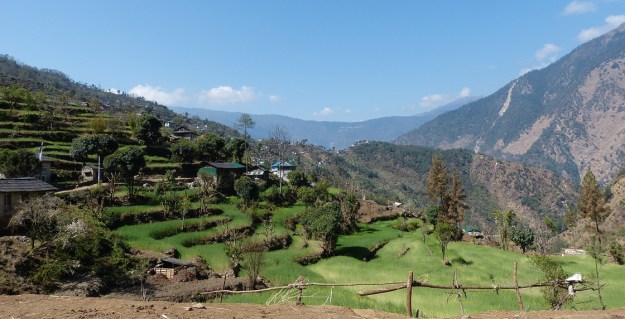
 The early morning light drapes the hillside with a chilly blue hue, but the sky above is clear. In the distance a curtain of morning mist opens briefly to reveal an immense white pyramid, and then closes again, as though they imagined it. They climb steep cobbled lanes, past orchards and neatly fenced paddocks, and, still cobbled, still steep, on a sunken lane through woodland. At the top a covered gateway leads them to the Trakshindu La. The 3070m pass is scruffy and windswept – a bare earth farmyard with a lodge, barns and animal enclosures. Contradicting all outward appearances, inside the lodge dining room every table has a pretty cloth and a vase with fresh flowers. Near the door is a huge copper basin filled with water, in which freshly picked marigolds float on the surface. An elderly woman arranges them lovingly. It is entirely unclear where in this harsh landscape these flowers could possibly have come from, or whom they are for.
The early morning light drapes the hillside with a chilly blue hue, but the sky above is clear. In the distance a curtain of morning mist opens briefly to reveal an immense white pyramid, and then closes again, as though they imagined it. They climb steep cobbled lanes, past orchards and neatly fenced paddocks, and, still cobbled, still steep, on a sunken lane through woodland. At the top a covered gateway leads them to the Trakshindu La. The 3070m pass is scruffy and windswept – a bare earth farmyard with a lodge, barns and animal enclosures. Contradicting all outward appearances, inside the lodge dining room every table has a pretty cloth and a vase with fresh flowers. Near the door is a huge copper basin filled with water, in which freshly picked marigolds float on the surface. An elderly woman arranges them lovingly. It is entirely unclear where in this harsh landscape these flowers could possibly have come from, or whom they are for.

 The trail becomes punishingly steep, a waterfall of dust and boulders. They continue down, glad of knee supports and trekking poles. Below, they can hear, and then see, an icy blue river and a huddle of huts. This river is their first glimpse of the Dudh Kosi – which they will follow for the next two weeks, all the way to its source, where at 4,700 metres it flows from the Ngozumba Glacier through Gokyo’s sacred lakes.
The trail becomes punishingly steep, a waterfall of dust and boulders. They continue down, glad of knee supports and trekking poles. Below, they can hear, and then see, an icy blue river and a huddle of huts. This river is their first glimpse of the Dudh Kosi – which they will follow for the next two weeks, all the way to its source, where at 4,700 metres it flows from the Ngozumba Glacier through Gokyo’s sacred lakes. Angtu has been firm again, and in the morning they are on the trail by 7.30am – heading uphill pretty much all day. The landscape is stunning, the sky is blue, and the temperature pleasant. They wish they could dawdle – taking two or even three days to cover the ground instead of just one. Ahead on the path a woman, stick in hand, gracefully flicks cattle dung from the ground into a doko basket on her back. Bamboo, fruit trees and even the occasional palm grow beside the trail. Angtu and Phurba chat and laugh. Phurba sings and quacks like a duck.
Angtu has been firm again, and in the morning they are on the trail by 7.30am – heading uphill pretty much all day. The landscape is stunning, the sky is blue, and the temperature pleasant. They wish they could dawdle – taking two or even three days to cover the ground instead of just one. Ahead on the path a woman, stick in hand, gracefully flicks cattle dung from the ground into a doko basket on her back. Bamboo, fruit trees and even the occasional palm grow beside the trail. Angtu and Phurba chat and laugh. Phurba sings and quacks like a duck. At the top of a steep flight of stone steps they pass through a monastery gateway. There is a choice – more steps to the gompa itself, or a pause for a tea-stop. L opts for tea and basks in the sun. D heads for the steps. At the top, prayer flags flutter and the gompa door is open. Inside, his socks slide on the polished wood floor. The walls and ceiling are alive with colour, shapes and patterns. Layers of fabric forming cylindrical frills, in reds, greens, yellows, blues and white, hang from the ceiling. One wall is made up of niches for prayer books. Two green-skinned drums stand sentinel over low cushioned benches for monk meditation. Outside again, the sunlight is dazzling and the lush green valley is spread out at his feet.
At the top of a steep flight of stone steps they pass through a monastery gateway. There is a choice – more steps to the gompa itself, or a pause for a tea-stop. L opts for tea and basks in the sun. D heads for the steps. At the top, prayer flags flutter and the gompa door is open. Inside, his socks slide on the polished wood floor. The walls and ceiling are alive with colour, shapes and patterns. Layers of fabric forming cylindrical frills, in reds, greens, yellows, blues and white, hang from the ceiling. One wall is made up of niches for prayer books. Two green-skinned drums stand sentinel over low cushioned benches for monk meditation. Outside again, the sunlight is dazzling and the lush green valley is spread out at his feet. In a tea-house in Bupsa they order noodle soup and omelettes. The owner’s tiny son shares a bench with D, playing a game on his mother’s phone. He edges along the bench, studiously ignoring D. D peers towards the screen and gives advice. The boy takes no notice, loses the game and slides closer to D. They both study the screen. The boy loses the game. He hands D the phone. D loses the game. The boy rolls his eyes and reclaims the phone. He loses the game. The boy gets comfortable, turning sideways, leaning back, using D as a back rest, feet on the bench, phone on his knees. D drinks his tea. The boy loses the game.
In a tea-house in Bupsa they order noodle soup and omelettes. The owner’s tiny son shares a bench with D, playing a game on his mother’s phone. He edges along the bench, studiously ignoring D. D peers towards the screen and gives advice. The boy takes no notice, loses the game and slides closer to D. They both study the screen. The boy loses the game. He hands D the phone. D loses the game. The boy rolls his eyes and reclaims the phone. He loses the game. The boy gets comfortable, turning sideways, leaning back, using D as a back rest, feet on the bench, phone on his knees. D drinks his tea. The boy loses the game. They climb back up the bank and onto the path, still behind the donkeys, and follow them into Paiya. At the entrance to the village there’s another hold-up. A workman has left a hammer on the narrow metal bridge, and there is no way one particular donkey is stepping over that hammer. No way. After some ineffectual shouting and pushing, the hammer is removed and the donkey train continues.
They climb back up the bank and onto the path, still behind the donkeys, and follow them into Paiya. At the entrance to the village there’s another hold-up. A workman has left a hammer on the narrow metal bridge, and there is no way one particular donkey is stepping over that hammer. No way. After some ineffectual shouting and pushing, the hammer is removed and the donkey train continues.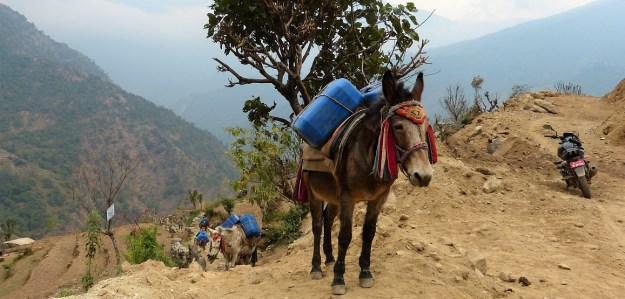

 They come to Moshe, a medieval-looking collection of tiny stone cottages and doorways in rock-faces. The land is worked – divided into little stone-walled fields and compounds. There are no shops or lodges or tea-houses. More than anywhere they’ve walked through so far, this place seems utterly untouched by tourism and modernity, separate, forgotten. Lukla’s town and airport are invisible and yet just a few hundred vertical metres above them. They are right in the flight path. Some days 1000 people pass over their heads, but each is oblivious to the other. They are worlds apart.
They come to Moshe, a medieval-looking collection of tiny stone cottages and doorways in rock-faces. The land is worked – divided into little stone-walled fields and compounds. There are no shops or lodges or tea-houses. More than anywhere they’ve walked through so far, this place seems utterly untouched by tourism and modernity, separate, forgotten. Lukla’s town and airport are invisible and yet just a few hundred vertical metres above them. They are right in the flight path. Some days 1000 people pass over their heads, but each is oblivious to the other. They are worlds apart. There is also a hybrid third group – the expedition porters. These guys tend to look and dress like trekking porters – young, fit and reasonably well equipped. However, it seems that they too are paid by the kilo as they carry ludicrous loads, the furthest distance, to base camps at the foot of the world’s highest mountains, covering many miles a day. They are doubled over under towers of chairs, rolls of carpet, steel folding tables, mattresses, drums of climbing gear, cooking gas cylinders, pots and pans. It’s seasonal and punishing work, but lucrative if they can get it.
There is also a hybrid third group – the expedition porters. These guys tend to look and dress like trekking porters – young, fit and reasonably well equipped. However, it seems that they too are paid by the kilo as they carry ludicrous loads, the furthest distance, to base camps at the foot of the world’s highest mountains, covering many miles a day. They are doubled over under towers of chairs, rolls of carpet, steel folding tables, mattresses, drums of climbing gear, cooking gas cylinders, pots and pans. It’s seasonal and punishing work, but lucrative if they can get it. Angtu acts as translator and go-between, making sure they have everything they need.
Angtu acts as translator and go-between, making sure they have everything they need. D: Are those yaks?
D: Are those yaks? L: 3%. Hardly any. And guess how much is barren land over 5,000 metres?
L: 3%. Hardly any. And guess how much is barren land over 5,000 metres? It’s still spitting when they make their way alongside the river bed, on a path of worn-smooth river stones. Ahead across the river are two long suspension bridges, one above the other, reaching from one hillside to the next. The lower one is no longer used. The higher one is a very long way up.
It’s still spitting when they make their way alongside the river bed, on a path of worn-smooth river stones. Ahead across the river are two long suspension bridges, one above the other, reaching from one hillside to the next. The lower one is no longer used. The higher one is a very long way up. There’s good news – the hotel is giving Angtu free accommodation and meals.
There’s good news – the hotel is giving Angtu free accommodation and meals.
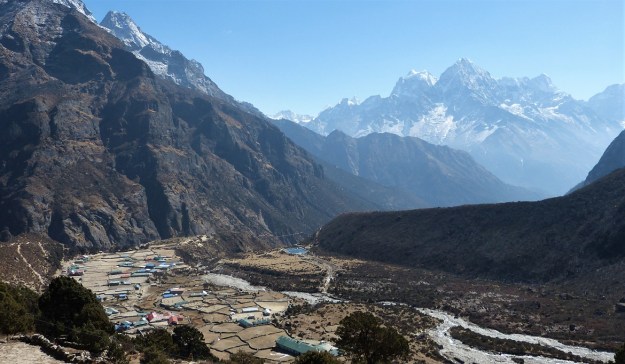

 He takes them up to a viewpoint above town. On the northern horizon, the clouds shift briefly.
He takes them up to a viewpoint above town. On the northern horizon, the clouds shift briefly.

 They cross the yak paddocks in Thame. Yaks are lying or grazing, wearing woven collars and big bells and wisps of crimson wool. On their withers is tied a white prayer-flag with Tibetan script printed in gold.
They cross the yak paddocks in Thame. Yaks are lying or grazing, wearing woven collars and big bells and wisps of crimson wool. On their withers is tied a white prayer-flag with Tibetan script printed in gold.
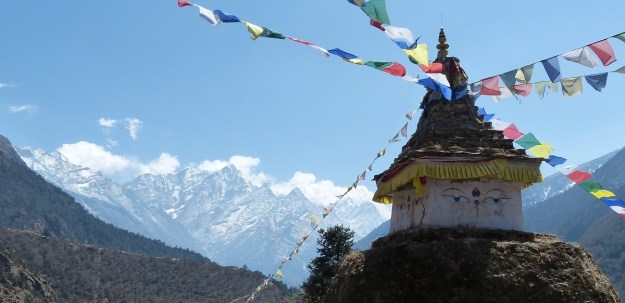
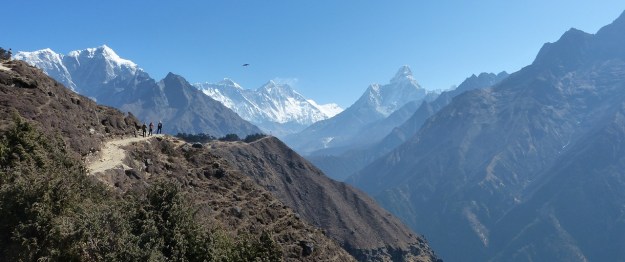
 A crumbling path rises vertically behind Namche Bazaar. Angtu groans loudly at intervals, grinning widely, as they climb 400 metres in under an hour, overtaking a steady stream of panting, less acclimatised trekkers.
A crumbling path rises vertically behind Namche Bazaar. Angtu groans loudly at intervals, grinning widely, as they climb 400 metres in under an hour, overtaking a steady stream of panting, less acclimatised trekkers. All day they walk towards Ama Dablam pointing haughtily skywards, a backdrop to stupas, prayer-flags and picturesque yaks. It photo-bombs their pictures. It demands to be admired. It’s the most beautiful peak they’ve ever seen.
All day they walk towards Ama Dablam pointing haughtily skywards, a backdrop to stupas, prayer-flags and picturesque yaks. It photo-bombs their pictures. It demands to be admired. It’s the most beautiful peak they’ve ever seen. Often, pushing trekkers too high too fast is simply down to a battle by tour companies to offer competitive prices and so a tightly timed itinerary. Sometimes though, the reasons are a lot more sinister. There are scams where companies deliberately cause their clients to become ill, with altitude sickness or food poisoning, and then call in a helicopter which delivers the trekker to a private hospital. There are plenty of winners – kickbacks for all – the trekking company and guide, the helicopter company and pilot, and the private hospital. There is also one big loser. The trekker gets a curtailed holiday, a life-threatening illness, a helicopter ride, a stint in hospital, and a gigantic bill.
Often, pushing trekkers too high too fast is simply down to a battle by tour companies to offer competitive prices and so a tightly timed itinerary. Sometimes though, the reasons are a lot more sinister. There are scams where companies deliberately cause their clients to become ill, with altitude sickness or food poisoning, and then call in a helicopter which delivers the trekker to a private hospital. There are plenty of winners – kickbacks for all – the trekking company and guide, the helicopter company and pilot, and the private hospital. There is also one big loser. The trekker gets a curtailed holiday, a life-threatening illness, a helicopter ride, a stint in hospital, and a gigantic bill. Birch and rhododendron woods line the path, moss hanging from tree branches and the river is occasionally visible far far below. Frozen waterfalls and torrents of snow and ice stripe the cliffs overhead and cross the trail, incongruous in the strong sunshine and soft woodland.
Birch and rhododendron woods line the path, moss hanging from tree branches and the river is occasionally visible far far below. Frozen waterfalls and torrents of snow and ice stripe the cliffs overhead and cross the trail, incongruous in the strong sunshine and soft woodland. L: And what are the symptoms? Apart from feeling tired and breathless.
L: And what are the symptoms? Apart from feeling tired and breathless.
 At a lonely teahouse skirted by stone-walled yak paddocks, they stop for tea. The sun gleams off the blue tin roof, the pristine whitewash and the silver dish of a solar kettle.
At a lonely teahouse skirted by stone-walled yak paddocks, they stop for tea. The sun gleams off the blue tin roof, the pristine whitewash and the silver dish of a solar kettle. At the top of the pass they enter a long valley strewn with boulders. They pass the first of Gokyo’s sacred lakes on which a pair of orange Brahminy ducks glide and preen on the metal-grey water. Further on they reach the second sacred lake. It’s fringed with decorative cairns, placed there by Hindus and Buddhists for whom these lakes have religious significance, or by trekkers taking selfies.
At the top of the pass they enter a long valley strewn with boulders. They pass the first of Gokyo’s sacred lakes on which a pair of orange Brahminy ducks glide and preen on the metal-grey water. Further on they reach the second sacred lake. It’s fringed with decorative cairns, placed there by Hindus and Buddhists for whom these lakes have religious significance, or by trekkers taking selfies. A train of yaks lumbers by, calmly picking their way across the rocky ground, and swinging their big gentle lethal-weapon heads from side to side. Some have untidy white face markings on otherwise black woolly coats, as though they have been apple-dunking in a trough of whitewash.
A train of yaks lumbers by, calmly picking their way across the rocky ground, and swinging their big gentle lethal-weapon heads from side to side. Some have untidy white face markings on otherwise black woolly coats, as though they have been apple-dunking in a trough of whitewash. In this remotest of backwaters is a cluster of trekking lodges. Their bedroom has a carpet, a lake view and clean linen on the twin beds. The internet works and there is a plug for charging phones. A skylight lets the sun heat the space in the day. They look in wonder at the en-suite bathroom with Western loo, a basin and a shower tray.
In this remotest of backwaters is a cluster of trekking lodges. Their bedroom has a carpet, a lake view and clean linen on the twin beds. The internet works and there is a plug for charging phones. A skylight lets the sun heat the space in the day. They look in wonder at the en-suite bathroom with Western loo, a basin and a shower tray.